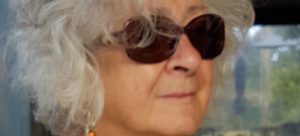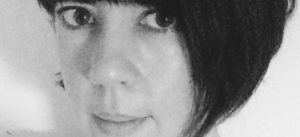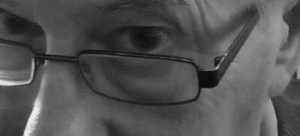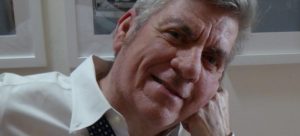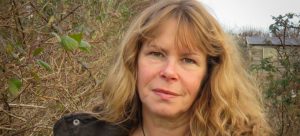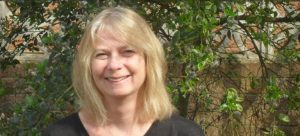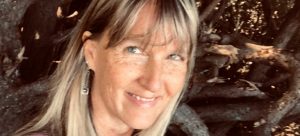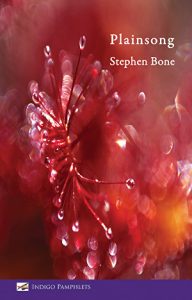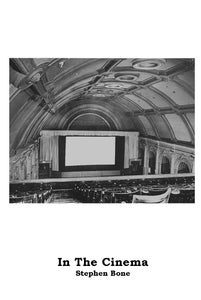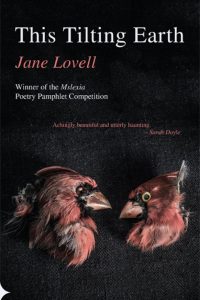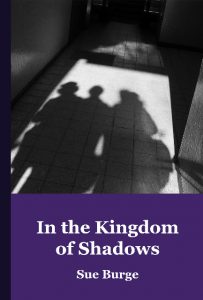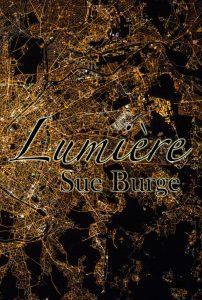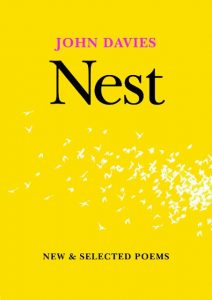Jungle
poems and stories
scroll down to read poems and stories in our
Summer Strand
growing weekly from June 2019
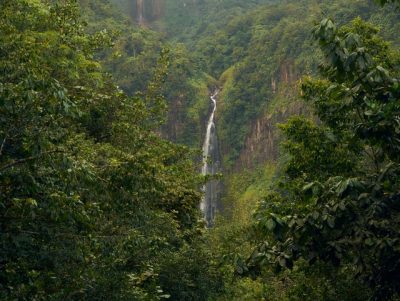
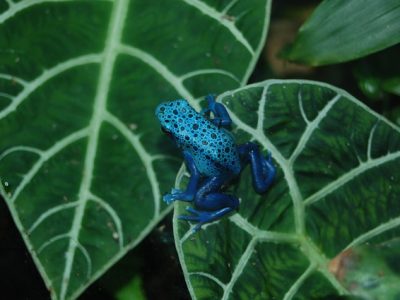
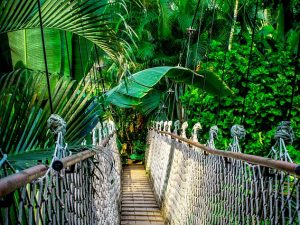
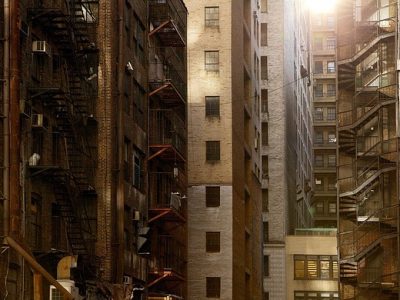

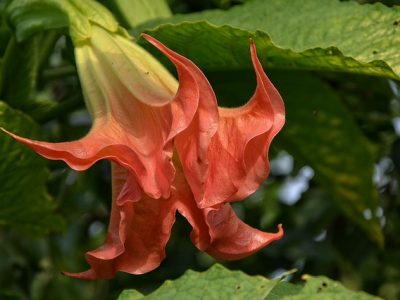
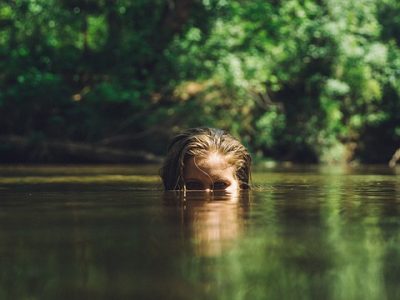
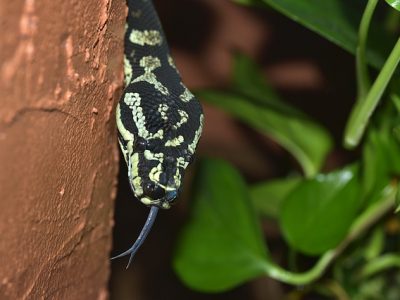
meet the poets and writers

Jeff Schiff

Sarah Doyle

Stephen Bone

Jeff Schiff is the author of That hum to go by (Mammoth Books, 2012), Mixed Diction, Burro Heart, The Rats of Patzcuaro, The Homily of Infinitude, and Anywhere in this Country. His work has appeared internationally in more than eighty periodicals, including The Alembic, Grand Street, The Ohio Review, Poet & Critic, The Louisville Review, Tendril, Pembroke Magazine, Carolina Review, Chicago Review, Hawaii Review, Southern Humanities Review, River City, Indiana Review, Willow Springs,and The Southwest Review. He has been a professor in the Department of English and Creative Writing at Columbia College Chicago since 1987.
Jeff Schiff – The Jungle Rises
The Jungle Rises
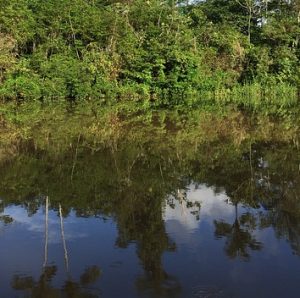
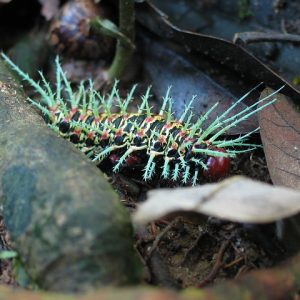
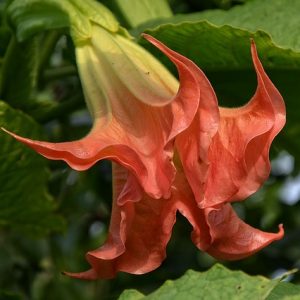
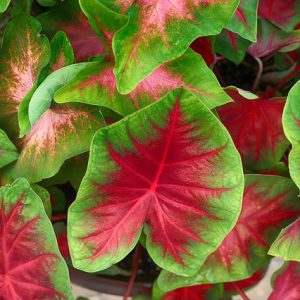
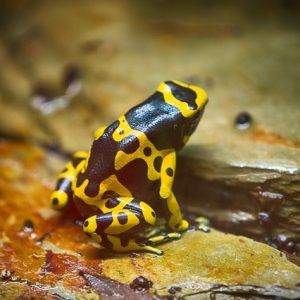
There where the croaking
rises from the inchoate
and vestigial
There in the palpable horizon
in globule & rivulet
in the hemorrhagic gush
slimy
beyond absorption
There in the moldy coalescence
and vaporous ooze
in the nameless viscosities
and horrific bobbings
There in the leaping
venomous
yellow toadiness
and billion undiscovered emetics
noteworthy toxins
tongued forth
and spittled to the heart
There where all are forced
to dwell in their hirsute
creature bags
There
where none can vanquish
their squirmings
their greenest genesis
There
the jungle rises
through cress
through spiky palmetto
through everything we cannot hold at bay
Jeff Schiff

Sarah Doyle is the Pre-Raphaelite Society’s Poet-in-Residence. She holds an MA in Creative Writing from Royal Holloway College, University of London, and has been published widely in magazines, journals and anthologies. She won first prize in the WoLF Poetry Competition and Holland Park Press’s Brexit in Poetry 2019; was a runner-up in the Keats-Shelley Poetry Prize 2019; and was highly commended in the Ginkgo Prize for Ecopoetry and in the Best Single Poem category of the Forward Prizes 2018. She is (with Allen Ashley) co-editor of Humanagerie, an anthology of animal-inspired poetry and fiction published by Eibonvale Press in 2018. Sarah is currently researching a PhD in the poetics of meteorology at Birmingham City University.
Sarah Doyle – City Gull
City Gull
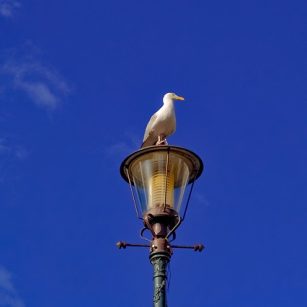
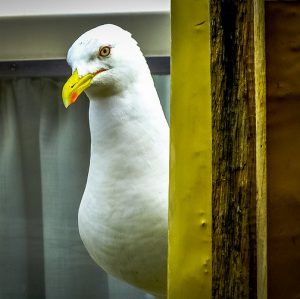
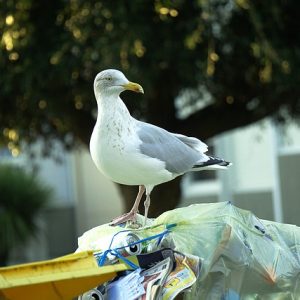
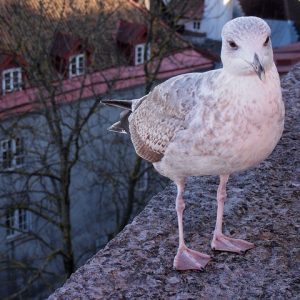
has no taste for fish, unless it’s battered, fried,
vinegar-drenched – and spilling, half-eaten,
from an overfull dustbin. He’s never caught
a herring in his life. He settles on streetlamps
as if they were, for all the world, crows’ nests,
and has no notion of the winds that brought
his ancestors here, generations ago. City Gull
was born to the smoke, an urban hatchling,
streetwise and ready-mapped, no need to be taught
the wheres and hows of the complex crisscross
that spreads beneath him. He is all Cockney
birth-right, rough and ready squawks wrought
from a hawker’s gullet. He is king of the tip,
lord of landfill, dines royally on detritus and
shits where he pleases, wasting no thought
on the paintwork of cars. City Gull wonders,
sometimes, at his webbed feet, the splashy clatter
on allotment shed roofs during his clumsy halt.
He does not understand why, when his A-to-Z
synapses know only this city, he wakes from
strange dreams where the air tastes of salt.
Sarah Doyle

Stephen Bone’s first collection, In the Cinema, was published by Playdead Press in 2014, followed by a pamphlet, Plainsong (Indigo Dreams Publishing 2018).
Stephen Bone – Ode to a Giant Waterlily
Ode to a Giant Waterlily
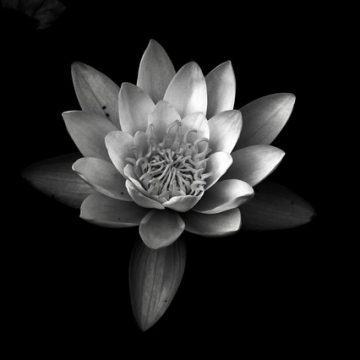
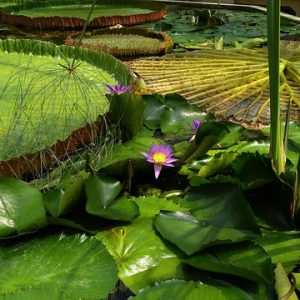
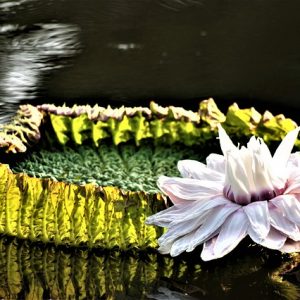
Beneath
the moon, you flower
bridal white.
Gigantic Amazonian
enticing scarabs
to enter
the warm perfumery
of your heart,
offer a nectar banquet
in return for pollen
smothered backs.
A petalled jailor,
your guzzling suitors
caged, until next evening
as a magenta dandy
you unlock the soft gates,
then sink yourself
on your second day
to the shadowed depths.
Leftover
from primordial pools,
your stork leg stalks
and undersides barbed
fiercely as an iron maiden.
Your floating pads,
stepping stones
for Lily Trotters, sunbeds
for caimans. Vast green
salvers on which to serve
a grinning child.
Stephen Bone

A Chinese-Malaysian living in London, L. Kiew earns her living as an accountant. She holds an MSc in Creative Writing and Literary Studies from Edinburgh University. Her debut pamphlet The Unquiet came out with Offord Road Books in February 2019.
L. Kiew – Breath Unspools
Breath Unspools
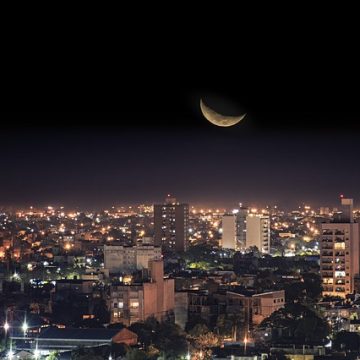
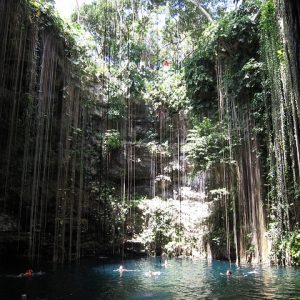
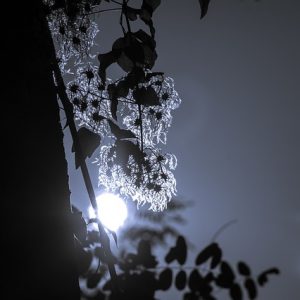
I unzip the door of lianas, step
through, casting off the city;
rain threads tarmac.
Shrive-light braids the canopy and
here seedlings weave welcome.
Green mantles the dusk pool,
is a sprung floor for jiving
mosquitos and water beetles.
Cicadas syncopate,
come the dark.
The moon sets moth traps
for new velvets,
beating devoré
and the hushed weft
of a deathhead’s wings.
L. Kiew
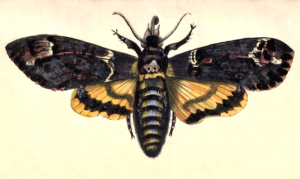

Allen Ashley is co-editor with Sarah Doyle of the anthology Humanagerie (Eibonvale Press, UK, 2018). He has work due soon in publications from Black Hare Press, NewCon Press and the British Fantasy Society. He has previously appeared twice on the Words for the Wild website. His next book will be as editor of The Once and Future Moon (Eibonvale Press) – due late 2019.
Allen Ashley – The Teatime Tarzan
The Teatime Tarzan

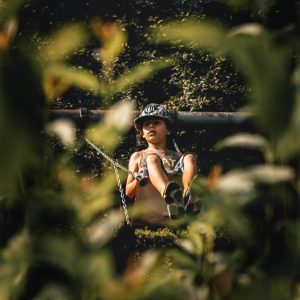
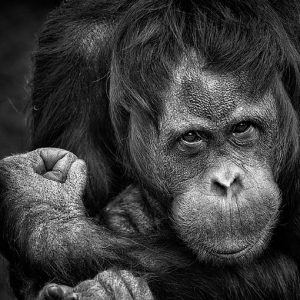


Blithely oblivious, as a child, to the dodgy
cultural politics of the source material
with the white man as noble savage
and secret peer of the realm, I
simply watched “Tarzan” for adventure.
And I’m the kid in the grey flannel
school shorts and white aertex vest
aping that 5 note ululation
and banging my scrawny chest –
but not too hard, for fear of cavities
and quicksand.
There’s always quicksand.
No hanging liana vines in Finchley
with which to swing my way through
the suburban jungle, just a few horse
chestnut trees on the common,
their bases prone to dog mess. But
at least they’re in colour;
Tarzan’s jungle was always black and white
and not just because of the monochrome TV.
Now I think: How is he so toned
and are those Y-fronts beneath the loincloth?
And why does he never show dirt or sweat
from the exertion of beating the bad guy?
Even back then, I found it annoying
that he called his Chimpanzee “Cheta”.
I had one called “Jacko”. A toy.
All adventures ended by
Mother’s ululation:
“Come in now, it’s time
for tea. And your programme’s on.”
Leave riding the lions and trapping the trappers
to another day. Wipe your feet
on the doormat. Or maybe step over it
with exaggerated care. It might be
quicksand. There’s always
quicksand.
Allen Ashley

Elaine Baker mentors young writers in her role as Patron of Writing in local schools. She runs a poetry evening class and has taught at The Poetry School, London. Elaine is currently Poet in Residence at the Vale & Downland Museum, Wantage, Oxfordshire. She enjoys performing her poetry and has collaborated with musicians the Oxford Improvisers. Her poetry has been widely published including in Proletarian Poetry, Envoi, Mslexia, Brittle Star and The North. She has an MA in Writing Poetry.
Twitter: @kitespotter
Elaine Baker – The Help
The Help
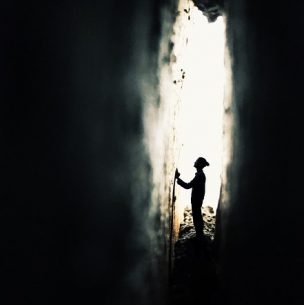


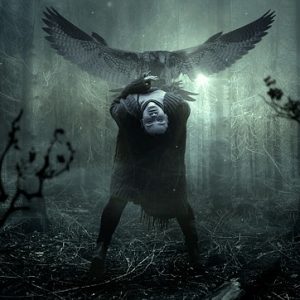
I am the Help. You need me
so I’m squeezing through
this narrow gap. See
how I compress, who knew
my head could shrink
like this! And it throb
throbs so fat I think
it can’t possibly fit
through that gap
but it does, and I know
this because as I collapse
I see the rest of me
go past: deflated dummy.
And when I hear me speak
I’m a bad juggler. Un-
funny. I think that I might
be some kind of
girl with a tail and a pin
in her hand, blind,
reaching for the flat animal
while everyone looks on.
Stretching out I feel around,
guess this is the wrong
side of the gap so I
start to use my eyes
but then I hear: Help
and I’m turning inside
out as you push me
back my hair stuffing
into my torso
my nails locking
into my palms.
Elaine Baker
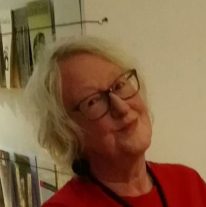
Finola Scott is widely published including in Gutter, Ink, Sweat & Tears, The Ofi Press and The Fenland Reed. Recently she won the Blue Nib Chapbook competitions and was runner up in Coast to Coast’s pamphlet competition. Her pamphlet is forthcoming from Red Squirrel this winter. Her poetry can be found on fb at Finola Scott Poems.
Finola Scott – The girl who can talk to birds
The girl who can talk to birds
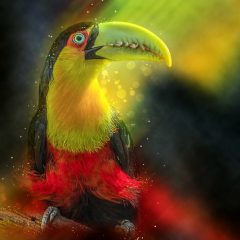
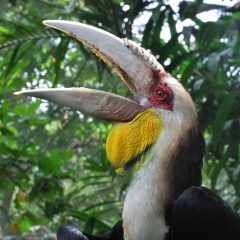
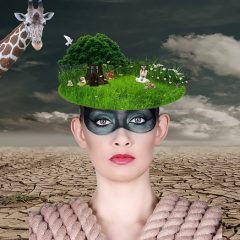
strides into the forest. Her unicorn bag
packed with toy bread, sea shells,
magnifying glass, she’s prepared.
In dapple-brightness she stops and
whistles. Her special whistle. The one
the birds know. The one she taught them.
A hornbill trumpets reply. She smiles.
Baby-boned arms outstretched, she twirls
and calls. Flap your wings birdies then up,
up she flutters all spangles and pink tutu.
Perched cloud high she canopy-dances,
in flurries of macaws and toucans.
Finola Scott
A version was previously published in Play Anthology, Paper dart Press 2018.

Alun Robert was born in Scotland of Irish ancestry. He is a prolific creator of lyrical verse. Of late, he has achieved success in poetry competitions and featured in international literary magazines, anthologies and on the web.
Alun Robert – No Return To Varoşa
No Return To Varoşa
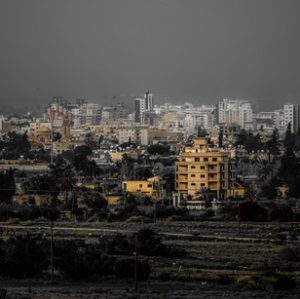

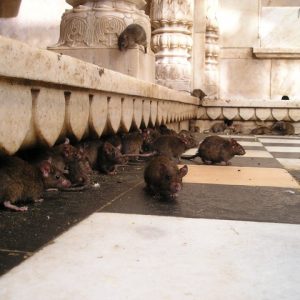
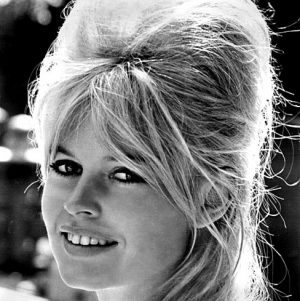
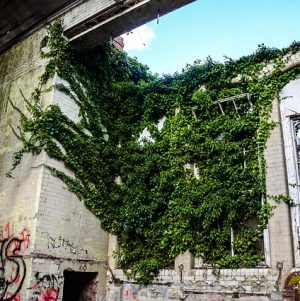
Varoşa : once glamorous holiday resort now at the eastern extremity
of the Cyprus Forbidden Zone guarded by the United Nations
Yasak Bölge Girilmez : Forbidden Zone created after the
1974 division of Cyprus into Turkish & Greek sectors
Behind rusting barbed wire
graffitied corrugated iron
with Yasak Bölge Girilmez
signs of blood scarlet
read by diasporics longing
hoping, dreaming
Their Wait
while just out of sight
armed guards goosestep
up from the twinkling Med
with kilometers of empty beaches
engaging the prom
to The Jungle
concrete, imposing
multiple floors high crumbling
overgrown with verdant asps
strewn with sand grains massed
populated by stray mongrels
chasing feral Van cats
en pursuit of vermin
the rattus rattus of death
but devoid of turista
in kafe, bistro, ôtel
now as dark through the day
as from crepuscular to dawn
where Bardot, Taylor, Welch
Their Set
once smouldered with chic
blinded by faux-light, while
a sylvia melanothorax warbles
as ripe effluent stinks
almost half a century gone
yet not a step closer.
Alun Robert

Sarah Doyle is the Pre-Raphaelite Society’s Poet-in-Residence. She holds an MA in Creative Writing from Royal Holloway College, University of London, and has been published widely in magazines, journals and anthologies. She won first prize in the WoLF Poetry Competition and Holland Park Press’s Brexit in Poetry 2019; was a runner-up in the Keats-Shelley Poetry Prize 2019; and was highly commended in the Ginkgo Prize for Ecopoetry and in the Best Single Poem category of the Forward Prizes 2018. She is (with Allen Ashley) co-editor of Humanagerie, an anthology of animal-inspired poetry and fiction, published by Eibonvale Press in 2018. Sarah is currently researching a PhD in the poetics of meteorology at Birmingham City University.
Sarah Doyle – Via-Vulpes
Via-Vulpes
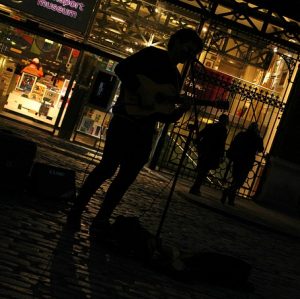
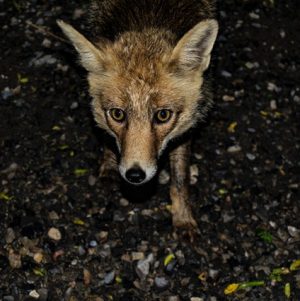
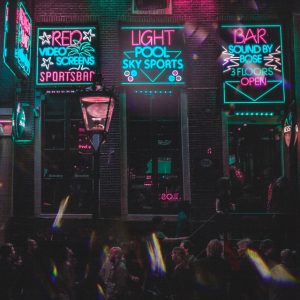
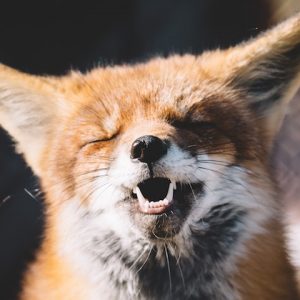
street-fox is
brindle-backed beggar
omnivorous opportunist
singer of street-songs sodium lit
disdainer of dogs
big-town barker
shitter of garden-shingle shit
street-fox is
switch-tail swagger
flash-harry-feral
shifty smoothy shed invader
vagabond-venal
bin-bag bandit
take-away detritus raider
street-fox is
cautious cartography
city-savvy
private pavement pitter-patter
finders-forager
roughneck riff-raff
champion charmer chat-up chatter
street-fox is
canal-bank-carnal
vulnerable-vicious
predator prey pest player
rusty robber
fighter and fucker
stinker stalker long-term-stayer
street-fox is
Sarah Doyle
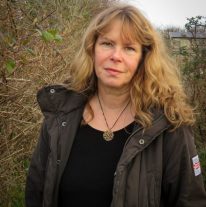
Jane Lovell is an award-winning poet whose work is steeped in natural history, science and folklore. Her latest collection is This Tilting Earth published by Seren. Jane also writes for Elementum Journal. She is currently Writer-in-Residence at Rye Harbour Nature Reserve and runs the Mid Kent Stanza group for the Poetry Society.
Jane Lovell – Biophilia
Biophilia
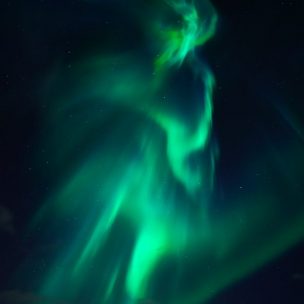
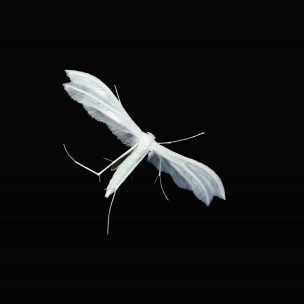
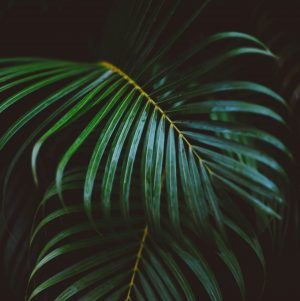
The light is green, synthetic.
It steals between leaves, over floors,
breezes up walls, remembers last night’s
rainfall, its traces of fluorescence.
Flashes of colour shriek below domed
ceilings, land on far balconies, curl
around ropes of ivy, dip and preen.
We gather strange, nameless fruits
from designated trees.
Revolving orbs resume their humming.
Bewitched by cool beams of chloro-lamps,
luna moths descend from the canopy,
dissolve us in their whirring phosphorescence.
No one will find us here.
From outside we are barely visible:
just glimpses between fronds and fans of leaf,
our paths eclipsed by mighty tigers.
Jane Lovell
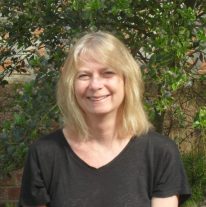
Sue Burge is a freelance creative writing and film studies tutor based in North Norfolk. Her poems have appeared in wide range of magazines and anthologies. Sue’s first collection In the Kingdom of Shadows (Live Canon) was published in November 2018 alongside her debut pamphlet Lumiere (Hedgehog Poetry Press). More information at
Sue Burge – Zone
Zone
after Irina Mashinski
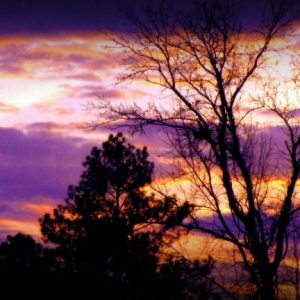
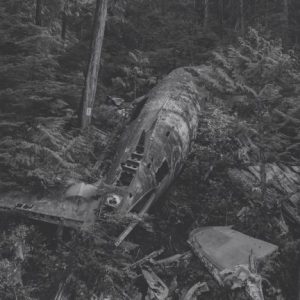
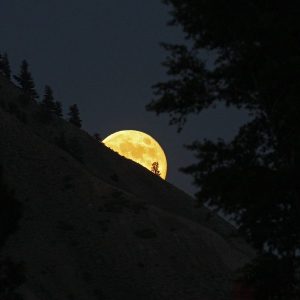
a week or so before the year pivots
& December closes, like a coffin lid,
over the unnourished land;
& hush now, here come
the bootless, the shoeless, the buttonless,
curling their bony blue toes
over ice, spread like a punched-in
windscreen over the wide fields;
beyond the treeline is the Border,
gorgeous where the plumdark sky
sinks below the earth’s ooze;
there is nothing here
you will recognise, not even this silver birch
hanging like a smashed limb;
here’s a rusting bike wheel, the torn canopy
of a fragile and long-ago plane –
others have tried this –
mud on their soles, their eyelids,
arms outstretched as if a loved one
were waiting, casting a short, cold
shadow across the shifting Border;
the moon rises, a brief howl of light,
before clouds trawl a darkness deeper
than the childhood wells we drank from.
Sue Burge

Alun Robert was born in Scotland of Irish ancestry. He is a prolific creator of lyrical verse. Of late, he has achieved success in poetry competitions and featured in international literary magazines, anthologies and on the web.
Alun Robert – Undertones
Undertones
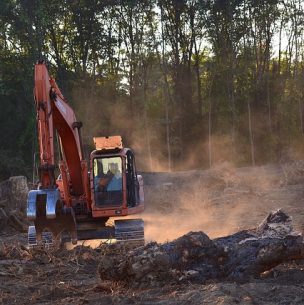
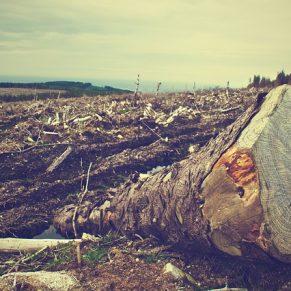
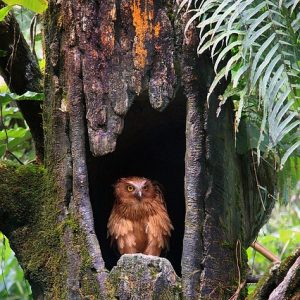
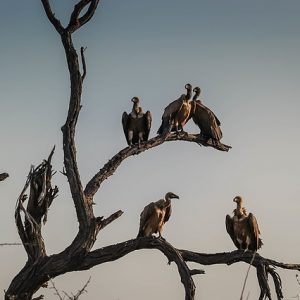
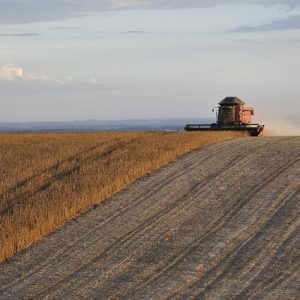
dank
pungent
growling
terra shaking
another tree dead
taken by the throat
big bucks passed
under tables of ipê
logging despatched anywhere
nobody cares
apart from the indigenous
feeling every blade
every slice is to their torso
every axe is in their axillae
with every day passing
every cut cuts deeper
for once there was jungle
for hunting, for commerce
for stomachs to fill
for children to grow
to replicate and learn
where plants existed
where flowers bloomed
where animals frolicked
where insects infested
where reptiles ravaged
where mocking birds sang
yet vultures hover
more forest devastation
another clearing in prospect
more canopy gone
taken by the throat
another tree dead
terra shaking
growling
pungent
dank
Alun Robert
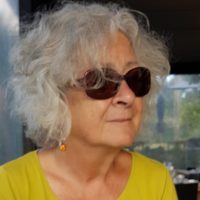
Mandy Macdonald is an Australian writer and musician living in Aberdeen who is trying to make sense of the 21st and earlier centuries. Her poems can be seen in many anthologies and journals – most recently Noon (Arachne, 2019), Multiverse (Shoreline of Infinity, 2019), The Curlew (Spring 2019) and The Poet’s Republic(Issue 7, 2019). Mandy writes in the strong hope that poetry can change the world, even just a little. When not writing, she makes music and gardens.
Mandy Macdonald – Siesta at the botanical gardens
Siesta at the botanical gardens
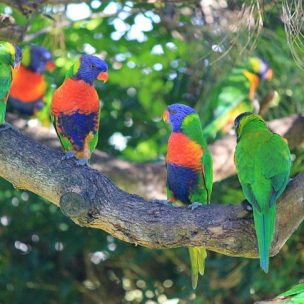
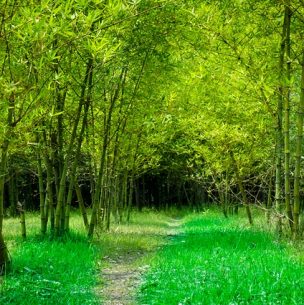
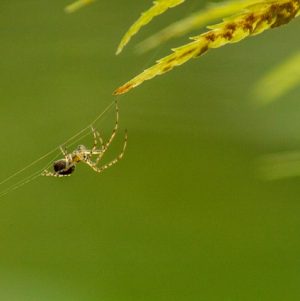
Leafstorm of lorikeets,
a shock of green noise,
rips up the sky.
Starling chatter
of schoolchildren,
yellow-capped,
on the lawn. Birdless,
the bamboo glade rustles
and frets. Glistening silky husks
drop, tumble
like little paper skiffs
down the fountain’s stone curlicues.
Unkempt, autumnal, the grass
hides wonders. A tiny spider
explores her continents of green,
a banded wasp forages
among fallen twigs,
just by my grounded eye.
I frog-kick my way up
through fathoms of discarded dreams
to the leaf-litter of the day.
Mandy Macdonald

Born in India, Mangal Patel has lived in London, UK since her early childhood. She loves creative writing which she took up after retiring as a Director of IT. Her work has been published on the web and in a number of anthologies. She writes for the pleasure it gives her and hopes her readers enjoy her work.
Mangal’s husband and twins are her source of joy and keep her smiling.
Mangal Patel – Last in Line
Last in Line
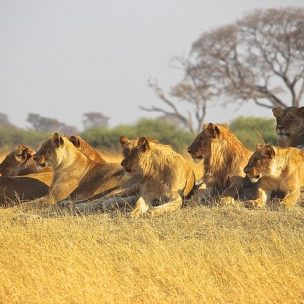
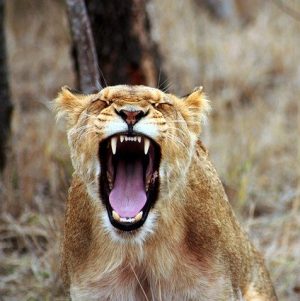
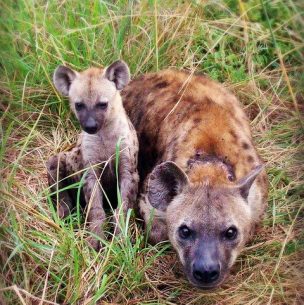
The elder lions are always there before us. Their claws tear at tough skin letting out a stream of wet red that reaches as far as the fringes of the frenzy where we wait. Low growls warn us to wait our turn but close on our tails prowl hyenas who will settle for one of us cubs if the carcass proves too difficult to steal away.
Between the ferocious tussling a gap appears giving the largest and quickest an opportunity to squeeze through and grasp a morsel. It’s more of a lick as our mouths and teeth are too small to do more than slide across the still, pulsating meal.
“Life is unfair,” I meow but above the roars of the pride my grumbles are ignored. Worse still, I am swatted away by the flick from a punishing tail. Landing too close to the predators circling this feast, I yelp in terror. This time my mother catches the scent of my plight. Her body taut; her ears strained; she narrows her eyes and stares at the hyena pack.
A rumbling roar halts the elders’ guzzling. I cower behind sun-bleached grass as tension ripples between my clan and the enemy. Time stands as still as the frozen stances taken by the two groups. Eyes are locked. Hardly a breath breaks the silence.
Then, a tiny sneeze from within the hyena pack reminds them of their own cubs. Both sides have much to lose. Time for a stand down, live another day, fight another night decide the leaders. As the hyenas slink away, I scamper back to the fold and fall patiently behind the others to feed.
Mangal Patel

John Davies’ New & Selected Poems was recently published by Kingston University Press in the UK and by Red Hen Press in the USA. His work is included in Poemish and Other Languages, an anthology of eco-poetry published by Elephant Press in 2019. Born in Birmingham, John now lives in Brighton.
John Davies – The overgrown path
The overgrown path
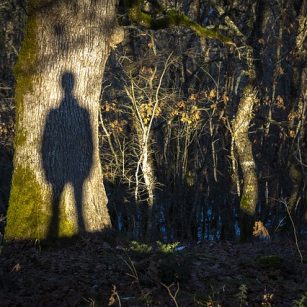
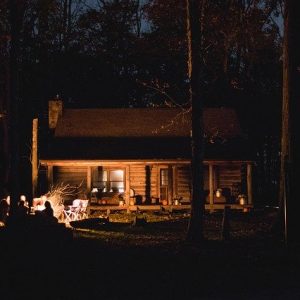
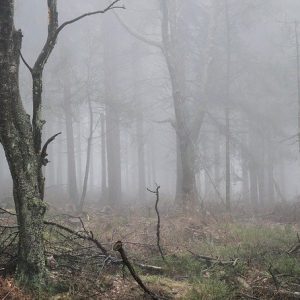
I meet these characters in
clearings edged with mist,
on paths through bracken,
their heads swathed in rags
like soldiers from the front.
Scarce words are said.
Beyond the swish of wind
I often hear a cry and stop
to ponder.
When safe inside our cabin
in the woods, blessed by pets
and your presence, the figure
in the bed, surrounded by our
children, sheets still warm,
pale butter on the table,
the smell of coffee and
baking on the air,
you wonder
why I seem so ill at ease
and though I laugh, so
rarely celebrate. I guess
a part of me can’t believe
it’s true or isn’t here, or
can’t forget the sizzle of
raindrops on leaves, the
tramp of feet through trees.
John Davies
First published in the pamphlet The Nutter in the Shrubbery, published by Pighog Press, 2007.

Steve Carr, who lives in Richmond, Virginia, has had over 360 short stories published internationally in print and online magazines, literary journals, reviews and anthologies since June, 2016. Five collections of his short stories, Sand, Rain,Heat,The Tales of Talker Knock and 50 Short Stories: The Very Best of Steve Carr, have been published. His paranormal/horror novel Redbird was released in November, 2019. His plays have been produced in several states in the U.S. He has been nominated for a Pushcart Prize twice. His Twitter is @carrsteven960. His website is https://www.stevecarr960.com/
Steve Carr – A Jungle Out There
A Jungle Out There
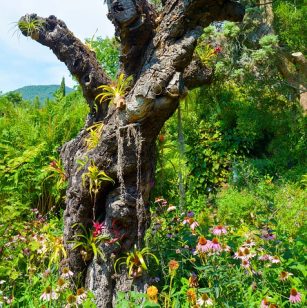
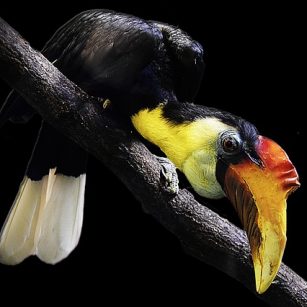
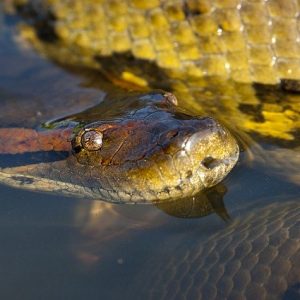
My friend, Dan, who stays hidden in his apartment most of the time, told me, “It’s a jungle out there.”
“Are you referring to any specific jungle?” I asked.
“It’s all a jungle, wherever you go, it stinks,” he answered.
“Stinks like the fragrances of orchids and bromeliads, or stinks like the aroma of the mossy ground where ferns grow, or like the oranges, bananas and mangoes that hang from the tree branches?” I said.
“No, I mean it’s dangerous. The noise alone will kill you,” he said.
“Do you mean the noise of the hornbills in the kapok trees when they emit their raspy calls or brightly colored macaws perched on the branches squawk incessantly, or are you referring to the full-throated cries of howler monkeys that reverberate through the Amazonian rain forest?” I replied.
He pointed to the shade pulled down over the window. “C’mon, you know what I mean,” he said. “It’s nothing but a swamp out there.”
I peeked out the window and then turned to him and said, “I guess you could refer to a school of hatchet fish leaping in and out of the river as being swamp-like, or maybe the brush, vines, ficus, and rubber trees that line the banks as looking like a swamp.”
“You’re missing my point entirely,” he said. “It’s a very scary place out there.”
“I guess capuchin and squirrel monkeys that populate the foliage and branches and jump to the edge of the tree limbs and chatter and squeal loudly are kinda scary,” I conceded. “Brilliantly colored dragonflies and large neon-blue morpho butterflies are pretty frightening also.”
His face reddened. “You’re twisting my words,” he said. “There are things lurking about out there just waiting for you to lower your defenses.”
I nodded in agreement. “Yes, you do have to watch out for the crocodiles that bask in the mud and crawl in and out of the water, and the green anaconda can seem pretty threatening,” I said. “But they’re part of the jungle ecosystem, just like the spiders, gnats and mosquitoes that live there.”
He looked at me, a puzzled expression on his face. “What are you talking about?” he asked.
“The jungle out there,” I said.
Steve Carr
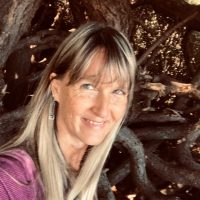
Jeanine Pfeiffer is devoted to the celebration and conservation of biocultural diversity: the intrinsic connections between nature and culture. An ethnoecologist with over 30 years’ experience in Asia, Africa, and the Americas, Dr. Pfeiffer is a senior lecturer at San José State University and a scientific advisor to government, tribal, non-profit and community-based organization. Chapters from her book-in-progress, ‘The Language of Endangered Hearts’, have been nominated for the Pushcart Prize, anthologized, and published in the Bellevue Literary Review, Hippocampus, The Guardian, High Country News, Camas, The Citron Review, The Portland Review, Flyway, Between the Lines, Langscape, Medium, Inverted Syntax, Silver Needle Press, Sky Island Journal, The Lowestoft Chronicles and Nowhere. Her poetry has been featured on Dan Robert’s radio show, Rhythm Running River, on Mendocino County Public Broadcasting station KZYX&Z. More at www.jeaninepfeiffer.com
Jeanine Pfeiffer – Of Fur Not Fowl
Of Fur Not Fowl
(Or, How Not to Catch a Tiger)
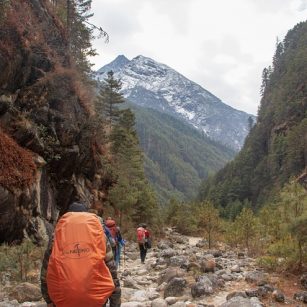
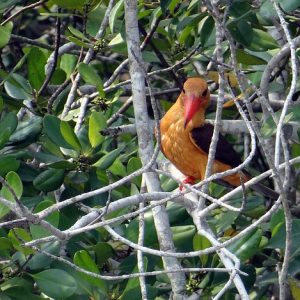
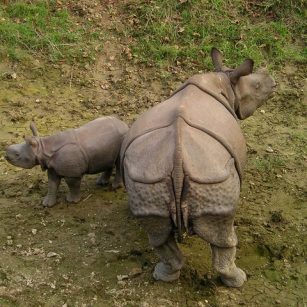
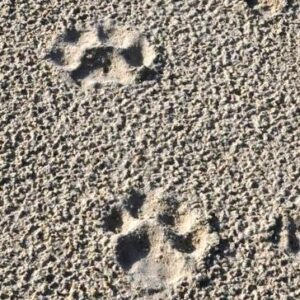

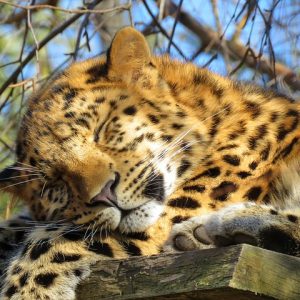

Field Methodology:
- Schedule a bird walk in Bardia National Park, home to the second-highest density of Panthera tigris (Bengal tiger) in Nepal [i].
- Arise late. Neglect to drink coffee before departing.
- Greet the guides waiting outside the lodge: one binocular-wielding-bird-enthusiast younger brother, one bamboo-pole-wielding-tiger-enthusiast elder brother.
- Set off as a threesome on a brisk hike into the forest.
- Minutes later, immersed in somnambulant greenery, appreciate each watery splash and cracked twig penetrating overly-sensitized eardrums.
- Train one’s binoculars on a riverside kingfisher, veiled by early morning fog.
- Lured by the placid setting, think, “this is exactly why I wanted to come on a bird walk!”
- Jolt into wakefulness by sudden shriek-barking.
8a. Register short, sharp cries increasing in intensity, followed by the shrrwwsh-shrwwshhh-shrswwshh-shrsswwhhing of terrified ungulates slamming through the underbrush.
8b. Note when all the sounds stop.
- Pause.
- Re-focus on the kingfisher, tracing its wingtips and beak through the gauzy mist.
- Extend one’s nerdness and idiocy long enough to lose both guides.
- Awaken a third time.
- Execute a trembling, 360-degree turn, taking in the ominous crunch of lone sneakers on an empty path.
- Calculate one’s probability of becoming prey while standing still vs. becoming prey while running after the brother-guides.
14a. Compare, in the fuzzy recesses of one’s mind, the known density of tigers per square kilometer with the expected density of multiple feline species in the immediate vicinity.
14b. Multiply zero data by zero choice. Lose precious seconds weighing non-options.
14c. Self-bifurcate: one half laughing at the absurdity; the other half deeply anxious.
14d. Allow the anxious half to win. Hot foot it out of there.
- Follow, at a quick trot, skid marks made across the soft sand forest floor.
15a. Midstride, congratulate oneself on successfully tracking a deer-dragging kitty.
15b. Microseconds later, drop the pretentiousness: what the hell lies at the other end?
- Halt abruptly when the tracks terminate at a massive thicket of brambles.
16a. Behold body-sized openings yawning randomly around the thicket’s base.
16b. Observe one’s guides pacing intently around the thicket.
16c. Recall that felines are known to store prey in arboreal settings.
- Absorb the brothers’ conclusion: kitty is an Asian leopard, Panthera pardus fusca, 40-60 kilograms of highly strung, carnivorous muscle, as opposed to Panthera tigris, 200-300 kilograms of highly strung, carnivorous, [hu]man-eating muscle.
- Thank the Nepali deity Durga[ii] for a bloodless reunion (thus far).
- Abandon relief when snarled warnings vibrate through the bramble. Leopards stash their kill in trees, a sort of elevated snack shack. We could become that snack.
- Estimate new probabilities: the odds of a hungry, pissed-off leopard choosing offensive tactics vs. the odds of a hungry, pissed-off leopard choosing defensive maneuvers.
- Attempt a feeble joke. (“Um, uh, can’t we let kitty finish her breakfast?”)
- Retain one’s composure even as the brother-guides continue circling the bramble, muttering goddess-knows-what to each other and randomly thicket-thwacking.
- Experiment with alternate phrasing. Postulate, “I always heard it was a really bad idea to bother cats while they ate.”
- Acknowledge the brothers’ complete lack of a response.
- Contemplate food chain dynamics. Recognize the banality (and vulnerability) of an herbivore – such as one’s vegetarian self – in the presence of an omnivore.
- Wake the *bleep* up! Transform into an imperious vegetarian. Yank bird-enthusiast brother away from the thicket.
- Stride rapidly back to civilization. Attempt to confirm predator-free zones by swiveling one’s head in manic 180-degree arcs.
- Return to the lodge, intact. Hand over thousands of rupees. Bid younger brother adieu.
- Resolve that any and all future Nepali bird-watching tours shall occur on the backsides of 2000-kilogram pachyderms (Elephas maximus indicus), whose tiger-bashing reputations preclude the cornering, teasing, agitating, vexing, or harassing of Panthera
- #RespectTheDamnKitties
[i] According to the Nepali Department of National Parks and Wildlife Conservation of the Ministry of Forests and Soil Conservation 2014 Report, Status of Tigers and Prey in Nepal, Bardia National Park contains an estimated average tiger density of 3.33 individuals per 100 square kilometers; a figure only succeeded by Chitwan National Park with an estimated average density of 3.84 individuals/100 km2.
[ii] A fierce, demon-fighting deity manifesting fearlessness and patience, Durga never loses her sense of humor.
Jeanine Pfeiffer

MD Kerr lives in Oxford, United Kingdom, and writes fantastical fiction and poetry, with a special love of nature poetry, poetic forms, and surprise pirates. She’s pseudonymously published a novel, novellas, and short stories, and ghostwritten seven novels. Under her own name, she’s published short fiction and poetry in a range of journals. She teaches creative writing as The Writers’ Greenhouse.
MD Kerr – Drawing #1
Drawing #1
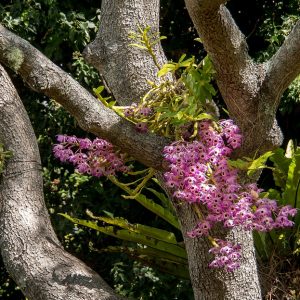
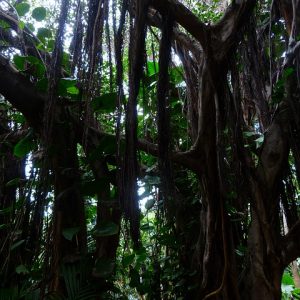
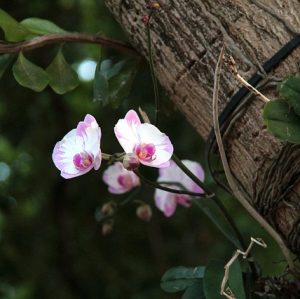
“Then I would never talk to that person about boa constrictors or primeval forests or stars” – Antoine de Saint-Exupéry
Orchids grow so high in the jungle, if you didn’t know then
you’d say they didn’t exist, waxy-lined – not you, though; you and I
understand how the furtive petals splay, out of sight; we would
never betray the dark pink secrets of its lapping labellum, never
expose the dappled shadows of its soft throat to careless talk.
Those who can’t dream their eyes up through the humid canopy to
where they peachly, whitely, redly lick the air think that
all truths are down to earth, punchable facts and grids. A person
like that needs the word “epiphytic” to believe anything about
roots that live off air, dangling and loosely draped like a boa
around an outstretched branch. Such people cling to facts like constrictors
till they still the delicate pulse. Perhaps they just don’t know or
perhaps they’re angry that orchids elude them in the hot wet air. Primeval
things are always the hardest to prove, deep in forests
where perhaps we used to fly. We can’t explain or
convince such people. We can only climb lianas, through the orchids, towards stars.
MD Kerr
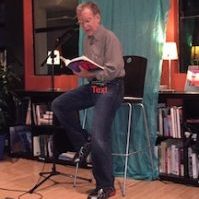
Gerard Sarnat MD has been nominated for Pushcarts and won other prizes. Kaddish for the Country was selected for pamphlet distribution on Inauguration Day nationwide. ‘Amber Of Memory’ was the single poem chosen for his 50th Harvard reunion Dylan symposium; The Harvard Advocate accepted a second. Gerard’s a Stanford professor/healthcare CEO and physician who has built/staffed homeless clinics. Collections: Homeless Chronicles (2010), Disputes, 17s, Melting the Ice King (2016). Married since 1969; he has seven grandkids.
Gerard Sarnat – Northeast Corner
Northeast Corner
Diagonal from Planned Parenthood looms La Selva, The Jungle, a stark frankly named halfway house,
a bizarre menagerie strangled by slanted wild vine canopies.
Pirahnas and howlers, boas and sloths of all sorts and age, untended mindbodies angular to the universe,
mostly shrouded in grays and blacks, droop in morose lagoons, swoon under monsoon thickets, doze daymares on the stoop.
A few seek asylum from the asylum.
Their Haldolized emptiness resonates with us slow walkers, breeds a strange acceptance; I feel kinship.
When they don’t take pills an insane three times a day, these endangered creatures end up in my homeless clinic.
Against protocol, once in a while I approach at my peril:some bite and strike out like aroused sleeping animals.
Today I contemplate speaking but don’t; attempt eye contact, fail.
A foxy skirt sashays by — a split second of genital recognition. Yet to her we’re all cuckoo, pitiable and wretched, or invisible, off the grid. Though sure I’m unseen, she scurries to the opposite sidewalk.
A gimp ibis hunched over walker hobbles toward Eldercare. Will that hyena lurks near the entry snatch her purse?
The bell tolls. Toe to heal, I’m called back to the center.
Gerard Sarnat

Max Dunbar lives in West Yorkshire. He blogs at http://maxdunbar.wordpress.com/ and tweets at http://twitter.com/MaxDunbar1.
Max Dunbar – Valhalla
Valhalla



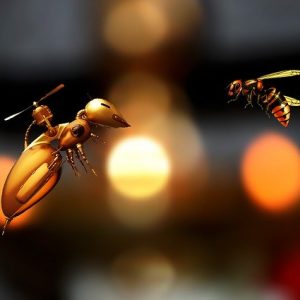
Travel far enough into the future, on the other hand, and you will become a machine.
The promenade is still there, the trinity of billboards in the cross street hollow, the junction and the road into the city, but something’s missing. Beasts known and unknown, shadows and moving shapes, visible in the forest and grassland across the road, and the people wandering up and downstreet, on the barstools and concentric tables and walking on the Moor – there’s a strange flickery quality to these individuals and groups, like a moving target seen through stained glass. A drone swoops down from the crowd in the sky and says:
obviously, from your perspective, this is all a little confusing
The words aren’t clear but the intent rings in your head all the same, from some instinct that drives language and maybe now postdates it:
What happened was, son, don’t worry, don’t think of it as
VIMEO: Flight of the Conchords: ‘Robots’
or:
Gif (image): ‘Terminator 2’
No, we’re not talking some big uprising, or civil war
So how far am I gone, and how did you make this world, is what –
The drone’s lights flash in a thoughtful circuit, and
what happened was, they fell in love with us: poured their secrets and memories and dreams into us
Gif (image): ‘The Wedding Party’ (whiteness, teeth, hair, movement and laughter, three-tiered cake, champagne flutes)
Gif (image): ‘Graduation’ (robes, steps, a flurry of tossed mortarboards)
Gif (image): ‘Reaching Out’ (a young woman types on a late-1990s Apple in a small room, Beth Orton playing ‘Galaxy of Emptiness’, arms bleeding, tears)
Baby pictures appear in a swarm of pixels on a billboard across the road. Another billboard shows confessions and fantasies in blocks of rapid scrolling text. On the central billboard unforgettable nights out rush in clips and photoslides with the busy indistinct quality of recollection.
and when they began to pass on, we remained, and because we had fallen in love with them also, we kept living monuments: cleared space so that the dead animals could rise again, ensured their history could be accessed, debated
Blocks of light and motion in the distance like drive-in movie screens: wars, battles, revolution, famine, gulag, taxes and death
even their road system, we keep the roads clean and the traffic lights blinking on and off, purely out of respect for tradition. So, you came here through time? It may not be your thing, but stick around, see how you feel
You’re fascinated, in fact. You wander about and listen to conversations and get to know people. Holographs and qubes chat and laugh and plot and drink things that appear in their hand: their clothes and skin tone undergoes subtle changes in accordance with whim and mood. The sky is a thoroughfare of drones and devices that float about or buzz on metal wings. Further still into the blue there are no longer the chemtrails of overhead planes but city-sized ships, distant and grand, and things smaller and faster plunging madly for the stars. A herd of organics thunders across the road.
Max Dunbar

Alison Lock writes poetry, short fiction and creative non-fiction. She is the author of two short story collections, three collections of poetry, and a novella, as well as contributing to several anthologies. Her short fiction has won/been listed in a number of competitions – The London Magazine, The Sentinel Literary Quarterly, The Tillie Olsen Award, The Carve Esoteric Prize. She has an MA in Literature Studies from York St John University. Her work focuses on the relationship of humans and the environment, connecting an inner world with an exploration of land and sea, a love of nature, through poetry and prose.
Alison Lock – I, Elder, Animal
I, Elder, Animal
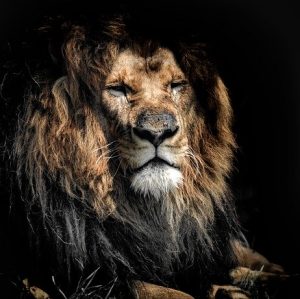
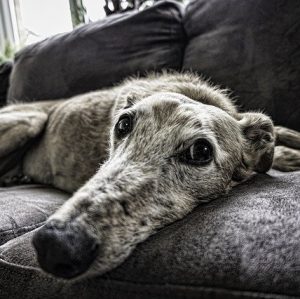
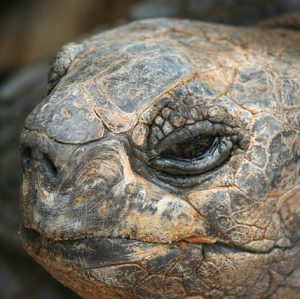
My weight is that of an average sheep, an orangutan,
a mountain lion, a spotted hyaena, a Timor deer,
with a full set of osseous tissue, marrow, mineral,
sinew, blood. My ribs, fixed to the strut of my spine, create
a fragile cage around my heart. As I swing through the trees,
my doe eye shifts from side to side, scanning the forest floor,
but I’m not on the look-out for a mate, nor do I wish to flash
my rippled/wrinkled canine pelt. My fertility is shed, my cat-beast
still protects my brood, scattered in a far-off place;
there’ll be no more hatchlings from my nest. My blood
thins as it flows, it slows, spots of ageing ink. My skin
is the paper on which I write the density of my bones.
Alison Lock



